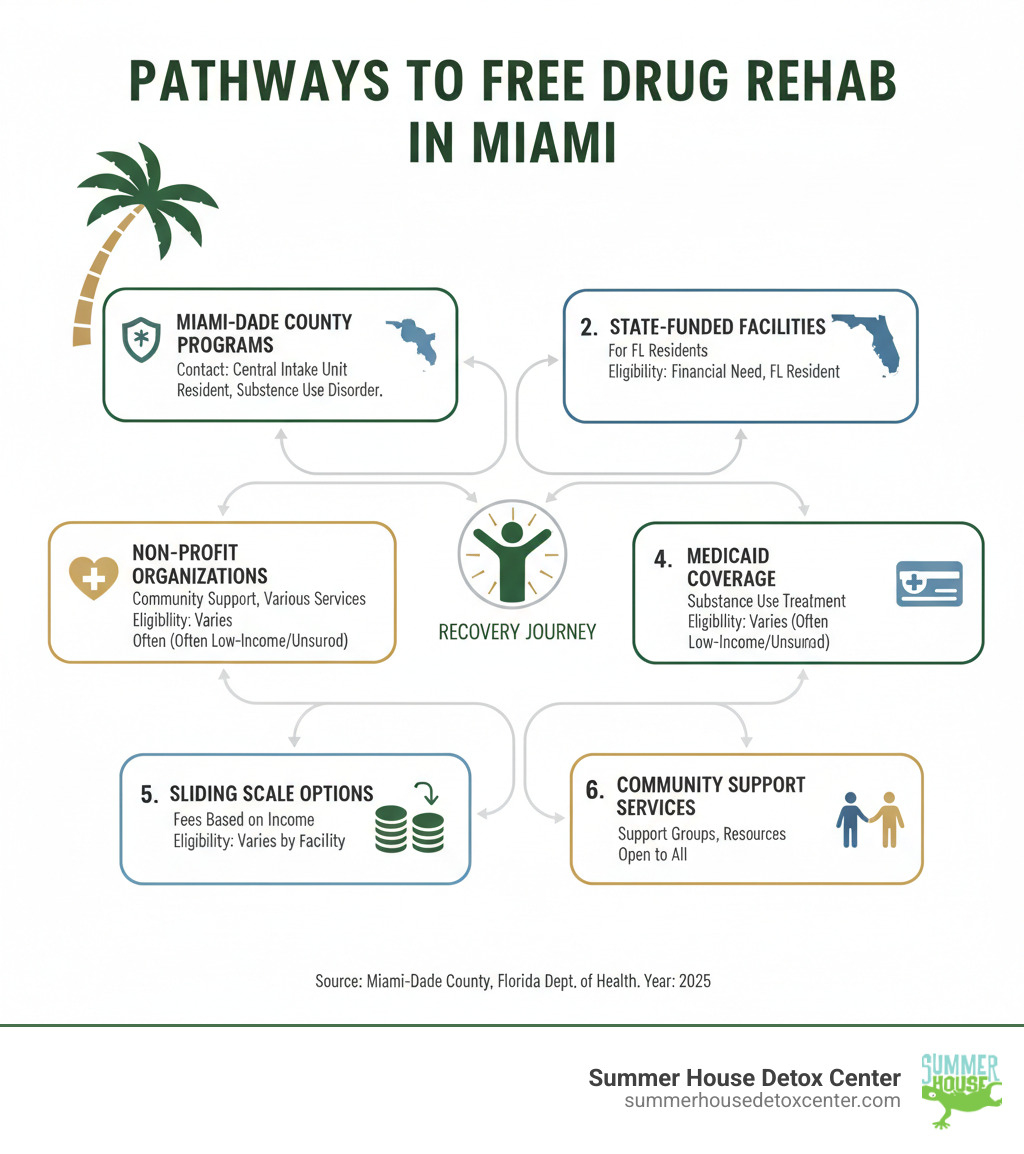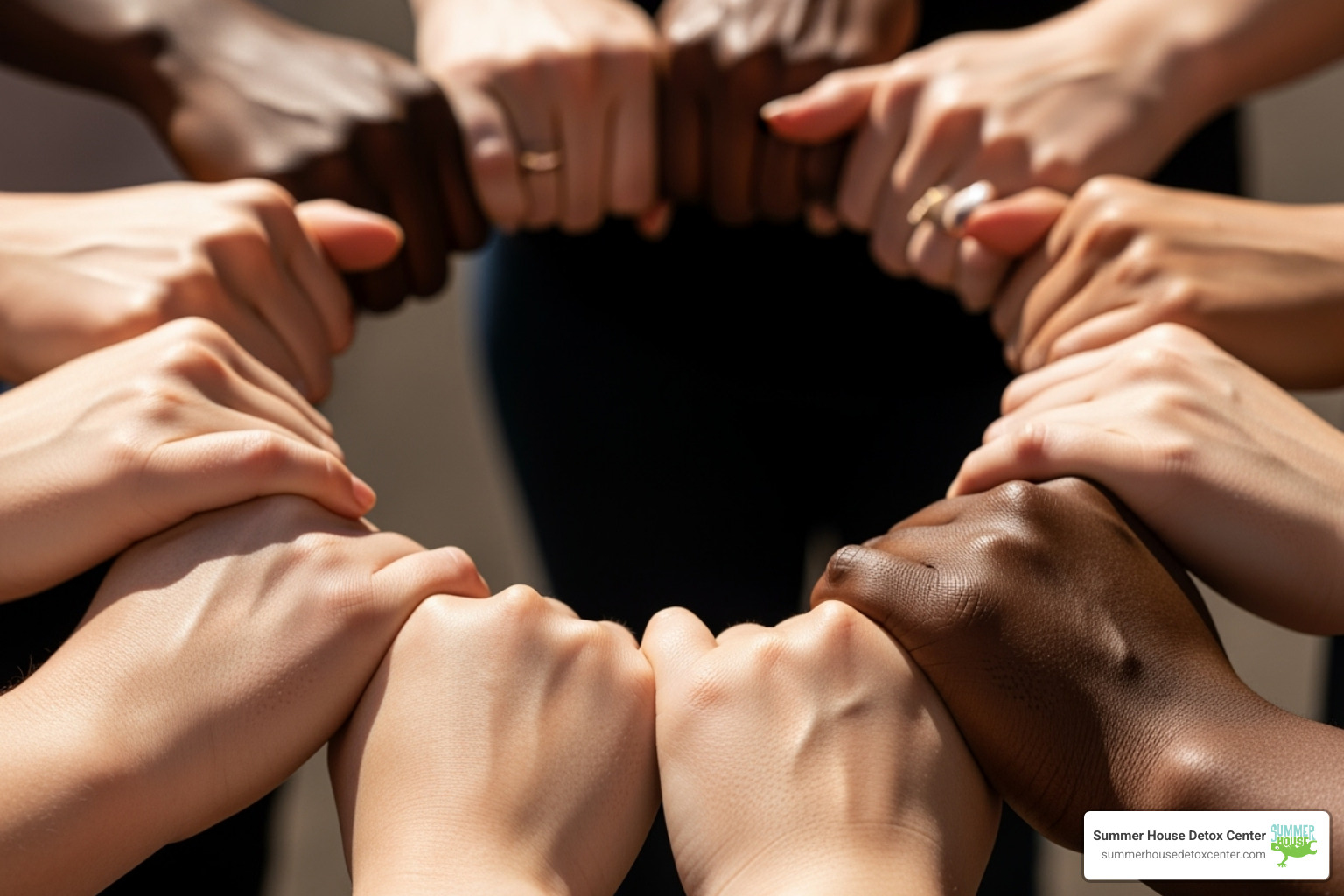Breaking Down Financial Barriers to Recovery in Miami
Free drug rehab miami programs exist to help people get the treatment they need without the crushing weight of financial stress. If you’re struggling with addiction and worried about costs, you have real options in Miami-Dade County.
Quick Answer: Free Drug Rehab Options in Miami
- Government Programs: Miami-Dade County Rehabilitative Services Division offers free residential and outpatient treatment
- State-Funded Centers: Florida provides treatment to residents who can’t afford private care
- Sliding Scale Programs: Many facilities adjust fees based on your income
- Non-Profit Organizations: Community groups offer free support and treatment services
- Medicaid Coverage: Florida Medicaid covers substance abuse treatment for eligible residents
The reality is harsh: addiction doesn’t discriminate based on income, but treatment options often do. Many people in Miami face the impossible choice between getting help and paying rent. The good news? Miami-Dade County and Florida have built a network of support specifically for people in your situation.
Research shows that Miami-Dade County’s Rehabilitative Services Division provides comprehensive residential and outpatient treatment to adults diagnosed with substance use disorders. The Central Intake Unit serves as the entry point for adults seeking evaluation and treatment placement, accepting referrals from courts, community organizations, and individuals themselves.
You don’t have to wait until you can afford private treatment. Help is available now, in your community, designed specifically for people who need it most.

Free drug rehab miami terminology:
Understanding Your Options: Types of Free and Low-Cost Rehab in Miami
When you’re searching for free drug rehab Miami options, you might feel overwhelmed by the different types of programs available. The good news? Miami-Dade County has built a comprehensive network of support that goes far beyond what many people realize.
State-funded programs form the backbone of free addiction treatment in Florida. These facilities receive funding directly from the state government, which means they can offer services at no cost to qualifying residents. The funding comes from various sources, including federal grants and state budget allocations specifically designated for substance abuse treatment.
Miami-Dade County initiatives take this support even further. The county’s approach isn’t just about providing treatment – it’s about creating a complete support system. Their programs integrate medical care, counseling, and social services all under one roof, making it easier for you to get comprehensive help without jumping between different agencies.
Non-profit partnerships play a huge role in Miami’s treatment landscape. These organizations often receive grants and donations that allow them to offer services for free or at dramatically reduced costs. Many have been serving the Miami community for decades and understand the unique challenges people face in South Florida.
Community-based support extends beyond formal treatment centers. Local organizations, faith communities, and peer support groups create a network of care that can complement formal treatment or provide ongoing support during recovery.
Sliding scale payments make treatment accessible even when it’s not completely free. These programs adjust costs based on your income and family size. If you’re unemployed or earning minimum wage, you might pay nothing at all. If you have some income, you’ll pay a portion that fits your budget.
The Miami-Dade County system works through a centralized approach that makes finding help much easier. You can learn more about available programs through their Substance Abuse Treatment Programs page, which provides detailed information about eligibility and services.
What makes Miami’s approach special is how these different types of programs work together. You might start with county-funded detox, move to a non-profit residential program, and then transition to community-based support groups – all without worrying about overwhelming costs.

How to Qualify and Apply for Free Drug Rehab Miami Programs
Getting into free drug rehab Miami programs might feel overwhelming, but the process is more straightforward than you might think. The key is understanding what programs are looking for and being prepared with the right documentation.
Most free drug rehab Miami programs exist specifically for people who can’t afford private treatment. That means the primary qualification is simple: you need help, and you can’t pay for it. It’s not about proving you’re “worthy” of care – addiction is a medical condition that deserves treatment regardless of your bank account.
Eligibility Requirements
When you apply for free programs in Miami-Dade County, you’ll need to show proof of income (or lack thereof). This isn’t meant to embarrass you – it’s how programs ensure their limited resources go to people who truly need them. Bring recent pay stubs, unemployment documentation, or a letter stating you have no income.
Florida residency is typically required for state and county-funded programs. You’ll need to show you live here legally, usually with a driver’s license or utility bill. Miami-Dade County programs specifically serve county residents, so make sure you qualify for the area you’re applying to.
Your insurance status actually matters less than you might think. Many people assume having Medicaid disqualifies them from free programs, but it’s often the opposite. Medicaid can open doors to additional treatment options, and county programs work with various insurance types.
Certain groups get priority in Miami’s system. If you’re pregnant, a veteran, living with HIV/AIDS, or use intravenous drugs, you’ll likely move up waiting lists faster. This isn’t unfair – it’s medical triage, ensuring people with the highest health risks get help first.
Application Process
Your journey typically starts with Miami-Dade County’s Central Intake Unit. Think of them as your treatment GPS – they figure out where you need to go and help you get there. They accept referrals from courts, community organizations, and people calling for themselves.
The process begins with a phone call or visit where you’ll go through screening and assessment. This isn’t an interrogation – it’s healthcare professionals figuring out what kind of help you need. Be honest about your substance use, mental health, and living situation. The more accurate information you provide, the better they can match you with the right program.
You’ll need to bring personal identification, something showing you live in Miami-Dade County, and any medical records you have. Don’t worry if you don’t have everything perfectly organized – the intake staff are used to working with people in crisis situations.
The SAMHSA treatment locator tool can help you explore additional options beyond county programs. It’s especially useful for finding programs that offer sliding scale payments or have different eligibility requirements.
Potential Waiting Lists
Here’s the reality: free drug rehab Miami programs, especially residential ones, often have waiting lists. This can range from a few weeks to several months, depending on the program and time of year. It’s frustrating when you’re ready to get help, but don’t let waiting lists discourage you from applying.
Persistence pays off. Keep following up with the Central Intake Unit. Your situation might change, or spots might open up unexpectedly. Programs also prioritize people based on medical urgency, so if your condition worsens, you might move up the list.
While you’re waiting, ask about outpatient services, support groups, or other resources you can access immediately. Many county programs offer outpatient treatment with shorter wait times, and this can be a crucial bridge while you wait for residential care.
Taking the step to apply is already a victory. Every person in recovery started exactly where you are now – making that first phone call and asking for help.

A Guide to Free and Low-Cost Addiction Resources in Miami
Finding free drug rehab miami services doesn’t have to feel like searching for a needle in a haystack. Miami-Dade County has built an impressive network of resources, and once you know where to look, you’ll find that help is closer than you might think.
The key to navigating this landscape is understanding that support comes from multiple sources. Government-supported programs form the backbone of accessible care, while community resource centers and non-profit organizations fill in the gaps with specialized services. Many facilities offer sliding scale payment options that adjust costs based on what you can actually afford, and local support systems provide ongoing encouragement throughout your recovery journey.
Before diving into any program, it’s always smart to verify payment options directly with the facility. Sometimes what looks expensive on paper becomes surprisingly affordable once you speak with their financial counselors.
Miami-Dade County Government Programs
Miami-Dade County doesn’t just talk about helping people – they’ve put real money and resources behind comprehensive addiction treatment. Their approach recognizes that free drug rehab miami services need to address the whole person, not just the addiction.
The Community Action and Human Services Department (CAHSD) serves as your gateway to county-supported treatment options. They’ve designed their programs to meet people where they are, whether you’re ready for intensive residential treatment or need to start with outpatient support while maintaining work or family responsibilities. You can explore their full range of services at Miami-Dade County Community Action and Human Services Department (CAHSD).
What makes Miami-Dade’s approach special is how they’ve created specialized programs for priority populations. If you’re homeless or at risk of losing your housing, their programs don’t just address your substance use – they help stabilize your living situation too. Pregnant women receive priority placement because early intervention protects both mother and baby. Veterans can access programs that understand the unique challenges of military service.
The county’s diversion and treatment initiatives offer hope even if you’ve had run-ins with the law. Instead of jail time, you might qualify for treatment programs that address the root causes of substance-related legal troubles. These programs operate on sliding fee scales, making them accessible even when money is tight.
Community-Based and Non-Profit Support for Free Drug Rehab Miami
Beyond government programs, Miami’s heart shows through its community organizations. These groups often started because someone in recovery wanted to help others find the same hope they found.
Local non-profit organizations understand that addiction affects the whole family. Their programs don’t just focus on getting clean – they help rebuild relationships and develop life skills that support long-term sobriety. What’s remarkable about many of these programs is how they combine professional treatment with genuine compassion.
Community-based support groups meet in churches, community centers, and libraries throughout Miami-Dade County. These aren’t formal treatment programs, but they’re often the lifeline that keeps people connected to recovery between formal treatment episodes. The peer recovery networks that grow from these groups create lasting friendships and accountability partnerships.
Faith-affiliated community resources approach addiction treatment through a lens of hope and redemption. Even if you’re not particularly religious, many of these programs welcome anyone seeking help. They often have access to donated resources and volunteer support that keeps costs low.
For comprehensive information about substance abuse services throughout the county, visit Miami-Dade County Substance Abuse Services.
Finding Other Affordable Options for Free Drug Rehab Miami
Sometimes the perfect free drug rehab miami program isn’t immediately available, but that doesn’t mean you’re out of options. There are several pathways to affordable care that many people don’t know about.
The Florida 211 helpline connects you with local resources you might never have found on your own. These operators know about emergency assistance programs, temporary housing options, and treatment facilities that might have just opened up a spot. They’re like having a knowledgeable friend who knows every resource in the community.
The SAMHSA National Helpline at SAMHSA National Helpline operates 24/7 and costs nothing to call. Their staff can help you find treatment options that fit your specific situation, including programs you might qualify for based on your income, family status, or other circumstances.
Teletherapy benefits have expanded dramatically, making counseling and support groups accessible from home. This can be especially helpful if transportation is a challenge or if you’re balancing treatment with work or childcare responsibilities. Many insurance plans now cover telehealth services, and some organizations offer free or low-cost online support.
Local support groups like AA and NA meetings happen throughout Miami every day of the week. While they’re not formal treatment, they’re completely free and provide the kind of peer support that research shows is crucial for long-term recovery. Many people find their sponsor and closest recovery friends through these meetings.
The path to recovery rarely looks exactly the same for any two people, but in Miami-Dade County, there are enough different approaches and resources that you can find something that works for your situation and budget.
Frequently Asked Questions about Free Rehab in Miami
When you’re searching for free drug rehab Miami options, questions naturally arise. The process can feel overwhelming, especially when you’re already dealing with addiction. Let’s address the most common concerns we hear from people in your situation.
What if I don’t qualify for free rehab in Miami?
Not qualifying for completely free drug rehab Miami programs doesn’t mean you’re out of options. Think of it like shopping for a car – if you can’t afford the luxury model, there are still reliable vehicles that can get you where you need to go.
Sliding scale fees are your best friend here. Many treatment centers adjust their prices based on what you can actually afford. When you call any facility, always ask: “Do you offer sliding scale payments?” You might be surprised how many say yes.
Payment plans can also make treatment manageable. Instead of paying everything upfront, you spread the cost over time. It’s like making monthly payments on something that could save your life.
If you don’t have insurance, HealthCare.gov might be a game-changer. The Affordable Care Act requires most health plans to cover substance abuse treatment. You could qualify for free or low-cost insurance that significantly reduces your treatment costs.
State-funded programs often have more flexible payment options than their “free” label suggests. Even if you don’t meet the strictest financial requirements, many still work with people who need help.
Some private facilities understand the financial reality of addiction and offer low-cost private options. At Summer House Detox Center, we believe personalized, medically supervised detox should be accessible. We focus on comfort, dignity, and support because everyone deserves quality care. You can learn more about our approach to personalized treatment plans for optimal recovery.
Remember: the most expensive treatment is the one you don’t get. The ongoing costs of addiction – financially, physically, and emotionally – far exceed any investment in your recovery.
How long are the waiting lists for free rehab services?
Waiting lists for free drug rehab Miami services vary quite a bit. It’s honestly one of the most frustrating aspects of seeking help when you need it most.
Residential programs typically have the longest waits because they’re comprehensive and completely funded. You might wait anywhere from several weeks to a few months. It’s not ideal, but understanding this reality helps you plan.
Outpatient programs usually have shorter waits or sometimes no wait at all. They can serve more people and require fewer resources than residential care.
Some people get priority placement. Pregnant women, people with severe medical complications, and those referred through the court system often move up the list faster.
Persistence matters more than you might think. Keep calling the Miami-Dade Central Intake Unit and the facilities you’ve applied to. Sometimes spots open up suddenly when someone transfers or completes their program.
While you’re waiting, don’t just sit there. Interim support can make a huge difference. Attend AA or NA meetings (they’re free and happen daily), look into teletherapy options, or connect with community mental health services. Any support is better than no support.
The wait can feel endless when you’re ready to change your life, but many people have walked this path before you and found their way to recovery.
What services are typically included in free rehab programs?
Despite being free or low-cost, these programs offer comprehensive care. You’re not getting a watered-down version of treatment – you’re getting real, effective services designed to support your recovery.
Medical detox is often the starting point. Miami-Dade County’s programs provide medically supervised detox to keep you safe and comfortable during withdrawal. Medication-Assisted Treatment (MAT) is frequently available, especially for opioid and alcohol addiction, helping manage cravings and prevent relapse.
You’ll find both inpatient and outpatient options. Some county residential programs offer 24/7 support in a structured environment with medical and psychiatric services. Other programs provide outpatient care that lets you live at home while attending therapy.
Individual and group counseling form the backbone of most programs. You’ll work one-on-one with a counselor to explore what led to your addiction and develop personal coping strategies. Group sessions connect you with others facing similar challenges – there’s something powerful about realizing you’re not alone.
Family therapy recognizes that addiction affects everyone who loves you. These sessions help heal relationships and build a supportive home environment for your recovery.
Life skills training might sound basic, but it’s incredibly valuable. Programs teach job readiness, financial management, and healthy communication. Some specialized programs especially focus on these practical skills for people who’ve lost stability due to addiction.
Case management means having someone help you steer everything from housing to healthcare. Think of your case manager as your recovery advocate, helping connect you with resources you need.
Relapse prevention education gives you tools to maintain sobriety long-term. You’ll learn to recognize triggers, develop healthy coping mechanisms, and create a solid recovery plan.
Some programs also include health testing and education for HIV, Hepatitis, and STDs, addressing broader health needs that often accompany substance use disorders.
These comprehensive services show that Miami’s free and low-cost programs are serious about quality care. They’re not just helping you stop using drugs – they’re helping you build a foundation for a healthier, more fulfilling life.
Your First Step Towards a New Life in Miami
Standing at the crossroads between addiction and recovery can feel overwhelming, but here’s what we want you to know: recovery is absolutely possible, and you don’t have to face it alone. In Miami, you’re surrounded by a community that understands your struggle and is ready to support your journey back to health.
The beautiful thing about Miami-Dade County is how seriously it takes addiction recovery. From the comprehensive programs offered through the County’s Rehabilitative Services Division to the compassionate care provided by local non-profits, there are genuinely multiple pathways to care available right here in your backyard. Whether you qualify for completely free drug rehab Miami programs or need sliding-scale options, the support system exists.
Cost should never be a barrier to getting the help you need. We’ve seen too many people delay treatment because they’re worried about finances, but as we’ve outlined throughout this guide, Miami has built an impressive network of accessible options. The Miami-Dade Central Intake Unit, state-funded programs, community organizations, and sliding-scale facilities all exist because your community believes in your potential for recovery.
Here’s the truth about timing: addiction doesn’t get easier to overcome with time. Each day presents an opportunity to choose a different path. Taking the first step might mean calling the Central Intake Unit, reaching out to SAMHSA’s helpline, or contacting a local treatment center to discuss your options.
If you’re looking for a more personalized approach to detox – one that prioritizes your comfort, dignity, and individual needs – that option exists too. At Summer House Detox Center, we believe that medically supervised detox should feel supportive rather than clinical. Our experienced staff, many of whom understand recovery from personal experience, create an environment where healing can truly begin.
Recovery isn’t just about stopping drug use; it’s about reclaiming your life and refinding who you are beneath the addiction. Miami offers you the chance to do this surrounded by resources, support, and hope. For more information about how personalized treatment can make a difference in your recovery journey, you can learn about our approach here: More info about personalized treatment plans for optimal recovery.
Your new life is waiting. The only question left is: are you ready to take that first step?
